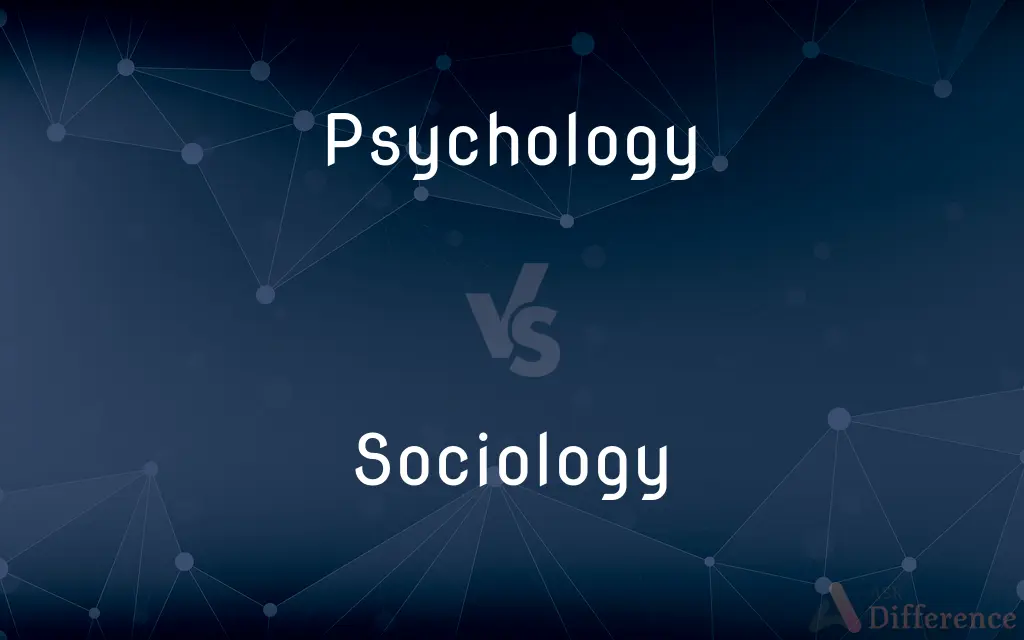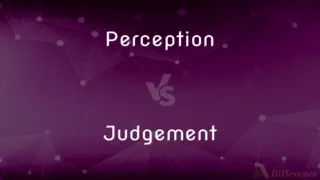Psychology vs. Sociology — What's the Difference?
By Tayyaba Rehman & Fiza Rafique — Updated on May 13, 2024
Psychology focuses on understanding individual behavior and mental processes, exploring how people think, feel, and behave, whereas sociology studies the behavior of groups and societies, examining social structures and interactions.

Difference Between Psychology and Sociology
Table of Contents
ADVERTISEMENT
Key Differences
Psychology concentrates on individual mental and emotional processes, exploring how various factors such as cognitive functions, emotions, and personal experiences influence a person's behavior. In contrast, sociology looks at the broader societal context, studying how social structures, cultural norms, and group interactions impact human behavior. This reflects a focus on the internal workings of individuals versus the external influences from society.
Psychologists often use experiments, observations, and clinical studies to understand and treat individual mental health issues, aiming to improve personal well-being. On the other hand, sociologists might employ surveys, ethnography, and statistical analysis to understand societal trends and dynamics, focusing on larger social policies and reforms. This underscores the difference in methodologies and goals between the two fields.
In psychology, theories such as cognitive-behavioral theory or psychoanalysis aim to unravel the complexities of the mind and address individual psychological problems. Meanwhile, sociology employs theories like functionalism and conflict theory to explain societal structures and issues, highlighting the difference in theoretical approaches.
Psychology can offer insights into developmental stages, personality formation, and psychological disorders, often applying this knowledge to counseling or therapy. Conversely, sociology provides a broader analysis of issues like race, gender, and class, applying findings to areas like urban planning, education, and public policy. This shows how each discipline applies its insights to different aspects of human life.
Both fields overlap in areas such as social psychology, where they jointly explore how societal influences affect individual behavior. This intersection highlights the complementary nature of psychology and sociology in understanding complex human behavior from micro and macro perspectives.
ADVERTISEMENT
Comparison Chart
Focus
Individual mental processes and behaviors.
Social structures, groups, and societal behaviors.
Methods
Experiments, clinical studies, observations.
Surveys, ethnography, statistical analysis.
Theoretical Basis
Cognitive theories, psychoanalysis.
Functionalism, conflict theory, social theories.
Application
Therapy, counseling, personal development.
Urban planning, education, policy reform.
Common Ground
Social psychology, studying social influences on individual behavior.
Social psychology, studying individual impacts on society.
Compare with Definitions
Psychology
The analysis of psychological theories and their application.
He teaches courses on psychology that cover theories from Freud to modern cognitive psychology.
Sociology
A field that studies social change and its effects on communities.
He is interested in sociology because he wants to understand urban development trends.
Psychology
The practice of diagnosing and treating mental health issues.
He practices psychology in a clinical setting, focusing on behavioral therapies.
Sociology
The application of sociological theories to solve social problems.
She applies her sociology background in developing policies for social welfare.
Psychology
The examination of individual emotional and mental behavior.
Her research in psychology explores the impact of trauma on personality.
Sociology
The exploration of group dynamics and societal norms.
She conducts sociology research on family structures across different cultures.
Psychology
A field concerned with the development and application of therapies.
She specializes in educational psychology to help students with learning disabilities.
Sociology
The study of the development, structure, and functioning of human society.
He studies sociology to better understand societal influences on crime rates.
Psychology
The scientific study of the human mind and its functions, especially those affecting behavior.
She studies psychology to understand the cognitive processes behind decision-making.
Sociology
The analysis of social institutions and their impact on human relationships.
Her sociology thesis examines the role of religious institutions in community cohesion.
Psychology
Psychology is the science of mind and behavior. Psychology includes the study of conscious and unconscious phenomena, as well as feelings and thought.
Sociology
Sociology is a social science that focuses on society, human social behaviour, patterns of social relationships, social interaction, and aspects of culture associated with everyday life. It uses various methods of empirical investigation and critical analysis to develop a body of knowledge about social order and social change.
Psychology
The science that deals with mental processes and behavior.
Sociology
The study of human social behavior, especially the study of the origins, organization, institutions, and development of human society.
Psychology
The emotional and behavioral characteristics of an individual, a group, or those engaged in a given activity
The psychology of war.
Sociology
Analysis of a social institution or societal segment as a self-contained entity or in relation to society as a whole.
Psychology
Subtle tactical action or argument used to manipulate or influence another
He used poor psychology on his employer when trying to make the point.
Sociology
A social science that studies society, human social interaction, patterns of social relationships, and the interactions of culture. Through both theory and applied research, it engages subject matters across a range of microanalysis, mesoanalysis, and macroanalysis.
Psychology
(Philosophy) The branch of metaphysics that studies the soul, the mind, and the relationship of life and mind to the functions of the body.
Sociology
That branch of philosophy which treats of the constitution, phenomena, and development of human society; social science.
Psychology
(uncountable) The study of the human mind.
Sociology
The study and classification of human societies
Psychology
(uncountable) The study of human or animal behavior.
Psychology
The study of the soul.
Psychology
(countable) The mental, emotional, and behavioral characteristics pertaining to a specified person, group, or activity.
Psychology
The science of the human soul; specifically, the systematic or scientific knowledge of the powers and functions of the human soul, so far as they are known by consciousness; a treatise on the human soul.
Psychology, the science conversant about the phenomena of the mind, or conscious subject, or self.
Psychology
The science of mental life
Common Curiosities
How do psychology and sociology differ in their approaches?
Psychology focuses on individual behaviors and mental processes using clinical and experimental methods, while sociology examines broader social patterns and group interactions using surveys and ethnographic studies.
Can psychology and sociology overlap in their studies?
Yes, both fields overlap in social psychology, where they examine how societal influences affect individual behavior and vice versa.
What is psychology?
Psychology is the scientific study of mind and behavior, focusing on individual mental health and cognitive processes.
What can you do with a degree in psychology?
A degree in psychology can lead to careers in mental health counseling, clinical psychology, research, and education.
Which is more focused on individual therapy, psychology or sociology?
Psychology is more focused on individual therapy and mental health treatment.
How do psychological theories differ from sociological theories?
Psychological theories often focus on internal processes and mindsets, whereas sociological theories focus on external social structures and their influence on behavior.
What is sociology?
Sociology is the study of social behavior, social groups, and societies, focusing on patterns and structures within human interactions.
Which field examines social structures like family and religion?
Sociology examines social structures such as family, religion, and other social institutions.
Are there interdisciplinary fields combining psychology and sociology?
Yes, fields like social psychology and community psychology combine elements of both psychology and sociology to study comprehensive human behavior.
What can you do with a degree in sociology?
A sociology degree can lead to careers in social research, public policy, community planning, and education.
Share Your Discovery

Previous Comparison
Perception vs. Judgement
Next Comparison
Beneficence vs. NonmaleficenceAuthor Spotlight
Written by
Tayyaba RehmanTayyaba Rehman is a distinguished writer, currently serving as a primary contributor to askdifference.com. As a researcher in semantics and etymology, Tayyaba's passion for the complexity of languages and their distinctions has found a perfect home on the platform. Tayyaba delves into the intricacies of language, distinguishing between commonly confused words and phrases, thereby providing clarity for readers worldwide.
Co-written by
Fiza RafiqueFiza Rafique is a skilled content writer at AskDifference.com, where she meticulously refines and enhances written pieces. Drawing from her vast editorial expertise, Fiza ensures clarity, accuracy, and precision in every article. Passionate about language, she continually seeks to elevate the quality of content for readers worldwide.
















































